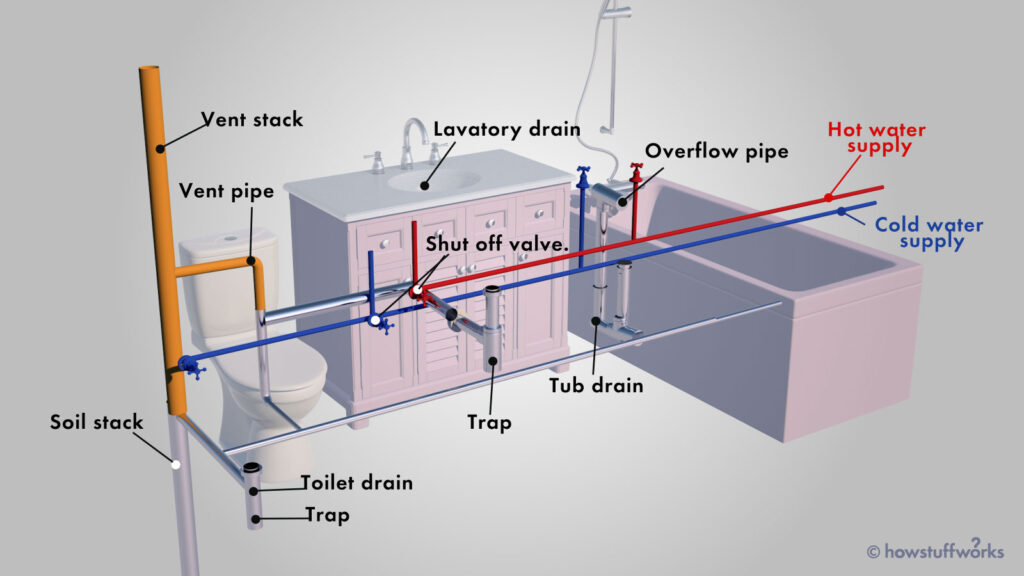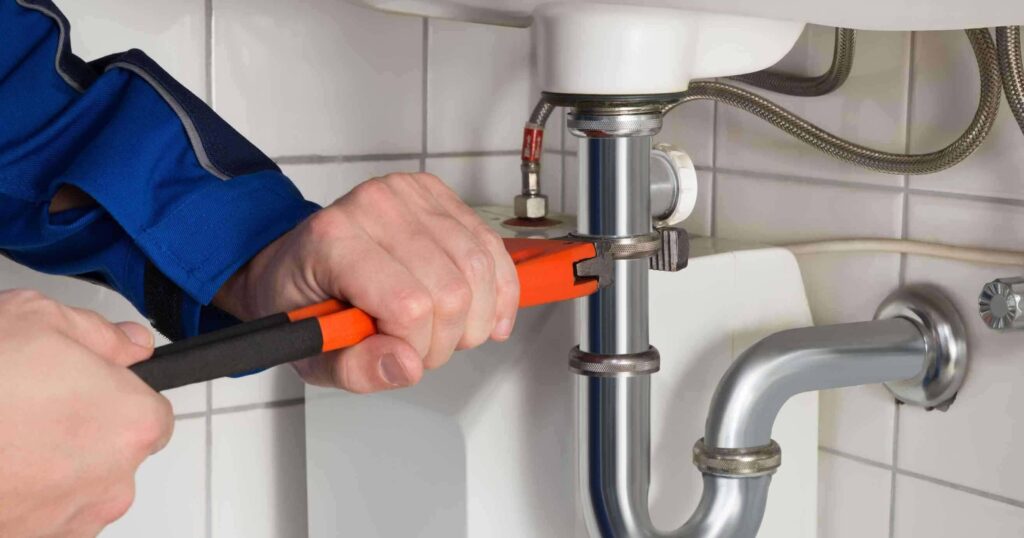
Welcome to your new home! As a new homeowner, you have plenty of exciting adventures and responsibilities ahead. One crucial aspect that often gets overlooked is the plumbing system. While it may not be the most glamorous topic, understanding how your home’s plumbing works and knowing some basic maintenance tips can save you time, money, and headaches down the road. In this blog post, we will guide you through five essential plumbing tips for new homeowners. Whether you’re facing a minor leak or need to tackle a major repair, these tips will help keep your plumbing in tip-top shape so you can enjoy your new space without any unexpected surprises. So let’s dive in and become masters of our own pipes!
Understand Your Home’s Plumbing System

Understanding your home’s plumbing system is the first step toward becoming a savvy homeowner. While it may seem complex at first, taking the time to familiarize yourself with how everything works will pay off in the long run.
Start by locating your main water shut-off valve. This valve controls the flow of water into your home and is crucial in case of emergencies such as burst pipes or major leaks. Knowing its location and how to turn it off can prevent extensive damage and costly repairs.
Next, get acquainted with your water heater. Find out if you have a traditional tank-style heater or a more modern tankless model. Understand how to adjust the temperature settings and be aware of any signs that indicate it may need maintenance or repairs.
Take note of where all the fixtures in your home are connected to the plumbing system. Each toilet, sink, shower, and appliance has its own set of pipes that supply water and remove waste. Understanding this layout will help you troubleshoot issues more effectively should they arise.
Additionally, learn about different types of pipes used in your home’s plumbing system. Common types include PVC (polyvinyl chloride), copper, galvanized steel, and PEX (cross-linked polyethylene). Knowing which materials are used can assist you when making repairs or upgrades later on.
Consider creating a map or diagram of your plumbing system for future reference. Note down important locations such as shut-off valves, clean-outs for drains, and any other components unique to your property.
By understanding these basics about your home’s plumbing system from day one, you’ll feel empowered to handle minor issues confidently while knowing when it’s time to call in professional help if needed. Plumbing knowledge truly is power!
Learn The Basics Of Plumbing Maintenance

One of the most important things for new homeowners to learn is the basics of plumbing maintenance. Understanding how to properly care for your home’s plumbing system can save you time, money, and potential headaches down the road.
It’s crucial to know where your main water shut-off valve is located. This valve controls the flow of water into your home and is essential in case of a leak or emergency situation. Make sure everyone in your household knows where it is and how to turn it off.
Familiarize yourself with common plumbing tools such as a plunger, pipe wrench, and plumber’s tape. These simple tools can be incredibly useful for minor repairs or clogs that may arise.
Next, regularly inspect visible pipes for any signs of leaks or damage. Look for wet spots on walls or ceilings and listen for dripping sounds when faucets are not in use. Catching these issues early can prevent costly water damage.
Additionally, proper drain maintenance will keep things flowing smoothly. Avoid pouring grease down drains as it can solidify and cause blockages over time. Use drain covers to catch hair and other debris that could lead to clogs.
Consider scheduling regular professional inspections of your plumbing system. A licensed plumber will be able to identify potential problems before they become major issues.
By learning these basic plumbing maintenance tips as a new homeowner, you’ll be better equipped to handle small repairs yourself while knowing when it’s time to call in the professionals!
Fix Common Plumbing Problems Quickly And Easily

Dealing with plumbing problems can be a headache, especially for new homeowners. However, many common issues can be resolved quickly and easily with little know-how. Here are some tips to help you tackle those pesky plumbing problems like a pro.
Clogged drains are one of the most common plumbing issues homeowners face. To clear a clog in your sink or bathtub drain, start by removing any visible debris using a plunger or drain snake. If that doesn’t work, try pouring boiling water down the drain followed by a mixture of baking soda and vinegar. This chemical reaction often helps break up stubborn clogs.
Leaky faucets are another annoyance that can waste both water and money. The first step is to identify the source of the leak – it could be as simple as replacing a worn-out washer or o-ring. Turn off the water supply before disassembling your faucet to avoid any mishaps.
Running toilets is not only annoying but also wasteful. A running toilet can waste hundreds of gallons of water each day! The problem is usually caused by an issue with the flapper valve or fill valve inside the tank. Adjusting these components or replacing them if necessary should solve the problem.
Low water pressure is another common complaint among homeowners. Before calling in a professional, check for any obstructions in your pipes or valves that may be restricting water flow. Cleaning out mineral deposits from showerheads and aerators can also improve water pressure.
Foul odors coming from your drains can indicate bacteria buildup or other plumbing issues. One easy remedy is to pour half-cup baking soda down each drain followed by hot vinegar once every few weeks.
Remember, if you ever feel unsure about tackling a plumbing problem yourself, don’t hesitate to call in a licensed plumber for assistance!
Prevent Serious Plumbing Issues With Regular Maintenance

One of the best ways to avoid major plumbing problems in your new home is by implementing regular maintenance practices. By taking proactive steps, you can prevent small issues from turning into costly emergencies down the line.
First and foremost, make it a habit to regularly inspect your plumbing system for any signs of leaks or damage. Look for dripping faucets, water stains on walls or ceilings, and unusual sounds coming from pipes. Catching these issues early on can save you from dealing with extensive repairs later.
Additionally, be mindful of what goes down your drains. Avoid pouring grease or oil down the kitchen sink as they can solidify and cause clogs over time. Use drain catchers to prevent hair and debris from accumulating in bathroom drains.
Another important aspect of regular maintenance is checking the water pressure in your home. High water pressure can strain pipes and lead to leaks or bursts. Invest in a pressure regulator if necessary to keep it within safe limits.
Consider scheduling professional inspections at least once a year. A licensed plumber will thoroughly assess your entire plumbing system and identify potential problem areas before they escalate into major issues.
By following these simple maintenance tips, you’ll not only extend the lifespan of your plumbing but also save yourself from costly repairs and inconveniences in the future. Don’t underestimate how valuable regular upkeep can be when it comes to maintaining a well-functioning plumbing system!
Hire A Licensed Professional For Major Plumbing Repairs

Hiring a licensed professional for major plumbing repairs is crucial for new homeowners. While it may be tempting to tackle these issues yourself, it’s important to remember that plumbing systems can be complex and require specialized knowledge and skills. Here are a few reasons why hiring a professional plumber is the best choice:
1. Expertise: Licensed plumbers have undergone extensive training and have the knowledge needed to diagnose and fix plumbing problems correctly. They understand the intricacies of different types of pipes, fixtures, and systems, ensuring that your repairs are done accurately.
2. Safety: Plumbing repairs often involve working with potentially hazardous materials such as gas lines or sewage systems. A licensed plumber knows how to handle these situations safely, minimizing the risk of accidents or injuries.
3. Time-saving: DIY attempts at major plumbing repairs can end up taking much longer than expected if you’re not familiar with the process. By hiring a professional, you can save time and avoid unnecessary frustration.
4. Cost-effective: While hiring a professional may seem more expensive upfront, it can actually save you money in the long run. Their expertise ensures that repairs are done correctly the first time around, preventing further damage or costly mistakes.
5. Customer satisfaction: A quality plumbing professional understands the importance of customer satisfaction. They will go the extra mile to ensure that your experience with them is positive, from start to finish. Quality workmanship: Professional plumbers take pride in their work and strive for excellence in every job they undertake.
They use high-quality tools and materials to ensure long-lasting results
Remember, when it comes to major plumbing repairs in your new home, it’s always best to leave it in capable hands by hiring a licensed professional plumber
Conclusion
Being a new homeowner can be an exciting and rewarding experience. However, it also comes with its fair share of responsibilities, including taking care of your home’s plumbing system. By understanding the basics of how your plumbing works and implementing regular maintenance practices, you can avoid costly repairs down the line.
Remember these five essential plumbing tips for new homeowners:
1. Understand Your Home’s Plumbing System: Take the time to familiarize yourself with where your main water shut-off valve is located and learn about the different pipes and fixtures in your house.
2. Learn the Basics of Plumbing Maintenance: Knowing how to perform simple tasks like unclogging drains or fixing leaky faucets can save you money on professional services. Invest in some basic tools like a plunger, pipe wrench, and drain snake.
3. Fix Common Plumbing Problems Quickly and Easily: Don’t ignore small issues as they can escalate into bigger problems later on. Address leaks promptly by tightening connections or replacing worn-out washers.
4. Prevent Serious Plumbing Issues with Regular Maintenance: Implementing routine maintenance practices such as inspecting for leaks, cleaning out drains regularly, and checking water pressure can help prevent major plumbing disasters.
5. Hire a Licensed Professional for Major Plumbing Repairs: While DIY fixes are great for minor issues, it’s important to know when to call in the experts. For complex problems or major renovations that involve altering your home’s plumbing system, always hire a licensed professional plumber.
By following these tips, you’ll have a better understanding of your home’s plumbing system and be equipped to handle common issues that arise along the way. Remember that prevention is key when it comes to maintaining your plumbing system – regular upkeep will save you time, money, and headaches in the long run!
So embrace this newfound homeowner responsibility with confidence! With a little knowledge about how things work under the surface (literally), you’ll be well-prepared to tackle any plumbing challenge that comes your way. Good luck, and enjoy your new home!

